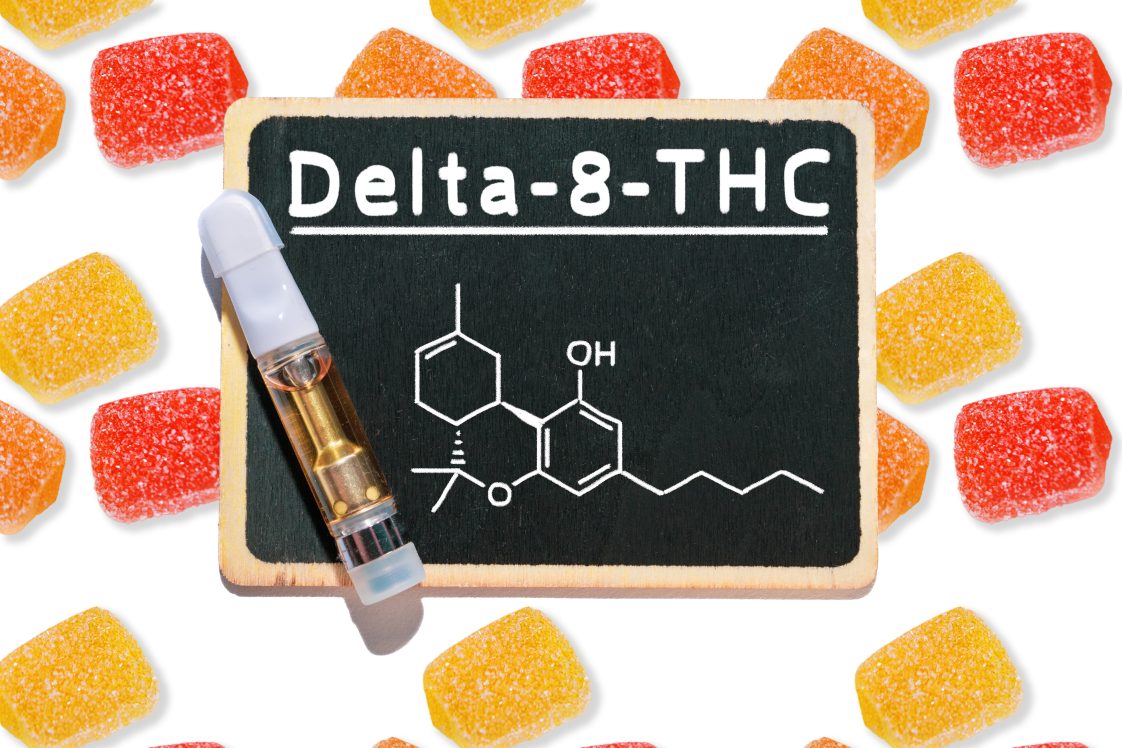Health

Delta-8 tetrahydrocannabinol (THC) is widely available to use in vape cartridges, gummies, and other products, often with no age restrictions. The following information will help people understand delta-8 THC, how it is legal, and any risks associated with vaping or ingesting this form of THC.
What is Delta-8 THC?
The THC that most people traditionally smoke, vape, and ingest is delta-9 THC from marijuana (Cannabis sativa). Delta-9 THC is a major cannabinoid and easy to extract from the cannabis plant. Cannabinoids are compounds that are found in the cannabis plant. Delta-9 THC is almost identical to delta-8 THC in its chemical structure. This almost-identical structure means that delta-8 and delta-9 act similarly in the body. For example, they both bind to the same receptors in the brain, which produces the experience of feeling high. However, delta-8 is reportedly milder than delta-9. Also, delta-8 is a minor cannabinoid in hemp and is more difficult to extract. The natural amount of delta-8 THC in hemp is low, so additional chemicals are needed to convert the hemp to delta-8.
It is speculated that there was an oversupply of cannabidiol (CBD) extracted from United States-grown hemp, so producers began looking for ways to turn the surplus of CBD into something profitable. The industry found ways to chemically convert CBD into delta-8 THC, thus delta-8 products were born.
How is Delta-8 legal?
The 2018 Farm Bill legalized commercial production of hemp as an agricultural commodity. Hemp was also removed as a Schedule 1 drug and is no longer considered a controlled substance. The federal government defines hemp as Cannabis sativa with less than 0.3 percent delta-9 THC. Hemp and marijuana are both Cannabis sativa. However, marijuana contains more than 0.3 percent delta-9 THC, and hemp contains less than 0.3 percent delta-9 THC. The amount of THC is important because it is the chemical that gives people the high feeling associated with marijuana. Since hemp has small amounts of THC and delta-8 is derived from hemp, it remains federally legal.
While hemp and delta-8 are federally legal, some states are moving to change that. Several states have banned all forms of THC, including delta-8. Currently, no laws in Alabama have been passed that ban delta-8, even though THC in other forms are illegal.
Delta-8 THC Risks
Advocates of delta-8 promote it as a healthy way to reduce stress, anxiety, depression, reduce inflammation, and reduce chronic pain. While people experience positive effects, there are some things to consider before vaping it.
Products are not FDA Approved
Products containing delta-8 THC are not approved by the US Food and Drug Administration (FDA) or any other governing body. Since products are unregulated, the information found on the label can differ from what is inside the package. This is true both in terms of the potency of delta-8 and other unanticipated ingredients, such as delta-9 or delta-10, which are compounds with similar effects. A recent study tested several delta-8 products and found that they had more THC than the label claimed and had potentially harmful byproducts, presumably from the chemical-synthesis process to convert the CBD to delta-8 THC.
Because there are low amounts of delta-8 THC in hemp, additional chemicals are needed to convert the cannabinoids into delta-8. There are no approved or regulated processes for these conversions. This means that many companies use unsafe chemicals that produce dangerous byproducts. These byproducts include delta-9-THC and heavy metals such as lead and mercury. Also, the manufacturing of delta-8 THC products may occur in uncontrolled or unsanitary settings. These settings may lead to unsafe contaminants or other potentially harmful substances.
Health Issues
Vaping delta-8 has additional health risks, especially if using flavored delta-8 cartridges. The FDA warns the public not to use vaping products that contain THC. These products have been connected to cases of serious lung injuries linked to vaping. Harmful chemicals are produced through the vaping process. These chemicals can irritate the lungs, causing coughing and wheezing, and counteract the anti-inflammatory benefits of hemp. Studies show that excessively vaping any form of THC can potentially lead to impaired functioning, addiction, or mental health issues. The FDA also reports adverse effects from delta-8 ingestion, including hallucinations, vomiting, tremor, anxiety, dizziness, confusion, and loss of consciousness.
Some people who use cannabis develop cannabis use disorder, which has symptoms such as craving, withdrawal, lack of control, and impairments completing tasks associated with everyday life.
Impact on Youth
Teens are four to seven times more likely to develop cannabis use disorder than adults are. While youth may think it is harmless, awareness that everyday use can be problematic for their health and wellbeing is important. Furthermore, national poison control centers and emergency rooms are reporting accidental child exposures of delta-8 THC products. It is important to talk to youth about delta-8 and make sure any products are secure and away from the reach of children.
More Information
- Kruger, J. S., & Kruger, D. J. (2022). “Delta-8-THC: Delta-9-THC’s Nicer Younger Sibling?” Journal of Cannabis Research, 4(1), 1-8.
- 5 Things to Know about Delta-8 Tetrahydrocannabinol – Delta-8 THC. https://www.fda.gov/consumers/consumer-updates/5-things-know-about-delta-8-tetrahydrocannabinol-delta-8-thc.
- Delta-8-THC craze concerns chemists. https://diverdi.colostate.edu/C442/references/processing/conversion/20210830%20d8-thc%20C&E%20News.pdf.

